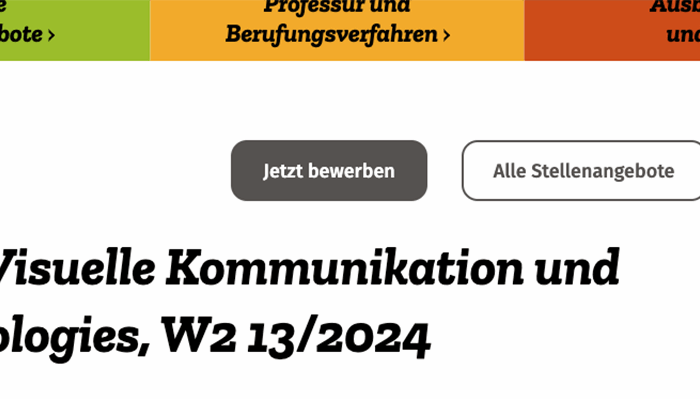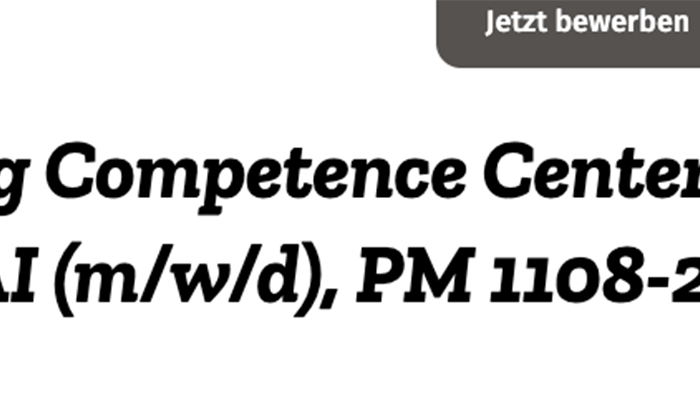Im Rahmen von „Driver of Future Transformation: DriFT@HsH“ starten wir nun mit dem Aufbau eines KI-Kompetenzzentrums für die Hochschule Hannover. Dafür suchen wir eine KI-begeisterte Projektleitung, die in einem interdisziplinären Team mit uns gemeinsam fakultätsübergreifend Künstliche Intelligenz an der Hochschule Hannover voran bringt. Klingt spannend?Einzelheiten […]
Alle Artikel von “Monika Steinberg”

Portfolio-Website zu Information Design: infodsgn.de
Unsere Portfolio-Website für studentische Ergebnisse aus dem Studienschwerpunkt Information Design im Studiengang Informationsmanagement [BIM] findet Ihr unter: https://infodsgn.de Diese Website löst das WebLab ab, dass seit 2017 studentische Arbeiten zu Medieninformatik bei BIM gebündelt hat. Das WebLab bleibt als Archiv und Portfolio der letzten Jahre […]

Zwei W2-Professuren an der F3 mit Schwerpunkt Creative Technology und 3D/Extended Reality zu besetzen!
W2-Professur: Visuelle Kommunikation und Creative Technologies W2-Professur: Visuelle Kommunikation mit einem Schwerpunkt 3D und Extended Reality Der Bewerbungsschluss ist der 17.07.25. Klingt spannend? Wir freuen uns auf Eure Bewerbungen! 🧡

Creative Technology@F3
An der Fakultät 3 – Medien, Information und Design [F3] sind kreative Technologien in einigen Studiengängen impliziter und gelebter Bestandteil der Curricula. KI-unterstützte Werkzeuge für z.B. Recherche, Datenanalyse, Lernen, Ideenfindung, Entwurf/Design, Prototyping, UX, Visualisierung, 2D/3D Animation, Bild-/Videogenerierung oder Texten sind inzwischen weit verbreitet. U.a. Visual […]

Austauschforum Lehrpraxis zu H5P
Gestern fand erneut das gute Mittagsformat „Austauschforum Lehrpraxis“ statt. Dieses Mal war das Thema H5P und ich durfte von unseren Erfahrungen berichten. Organisiert wird das Austauschforum vom Servicezentrum Lehre an der Hochschule Hannover. Ein Mal im Monat geht es in 60 Minuten um Erfahrungsberichte aus […]

New book available: Blended learning environments to foster Self-Directed Learning
I am glad to present a new book on self-directed learning that I think is well worth reading: Blended learning environments to foster Self-Directed Learning Van der Westhuizen, C., Maphalala, M.C. & Bailey, R. (eds.), 2022, Blended learning environments to foster self-directed learning, NWU Self-Directed […]

ICETM 2022: International Conference on Education Technology Management
The 5th International Conference on Education Technology Management (ICETM 2022) will be held in Lincoln, United Kingdom, during December 16-18, 2022. The conference has added online attendance / presentation for participants in case of you cannot attend the conference. Call For Papers ICETM2022 The submission […]

Lehren aus dem Off: Interview für com.unity
In seiner zweiten Ausgabe berichtet Hannovers neues Uniheft com.unity darüber, wie Studierende und Lehrende das erste „Corona-Semester“ im Sommer 20 erlebt haben.

Digitaler Campustag an der Hochschule Hannover: 6. November
Am 06.11.20 findet an der Hochschule Hannover der Digitale Campustag statt. Dafür wird das neue Studierendenzentrum am Campus Linden in ein digitales TV-Studio: das „Gelbe Studio“ verwandelt. „Neun Stunden lang geben wir von hier und auf YouTube live einen Einblick in das, was wir an […]

Videos in der digitalen Lehre: Do you need it perfect or by Tuesday?
„Do you need it perfect or by Tuesday? Videos in der digitalen Lehre“ lautete der Titel unseres Vortrags im Rahmen des Online-Workshops „Digitale Lehre in der Informationswissenschaft – Von der Pandemie bedingten Notwendigkeit zu Lessons Learned und Best-Practices“ am 25.09.20.
